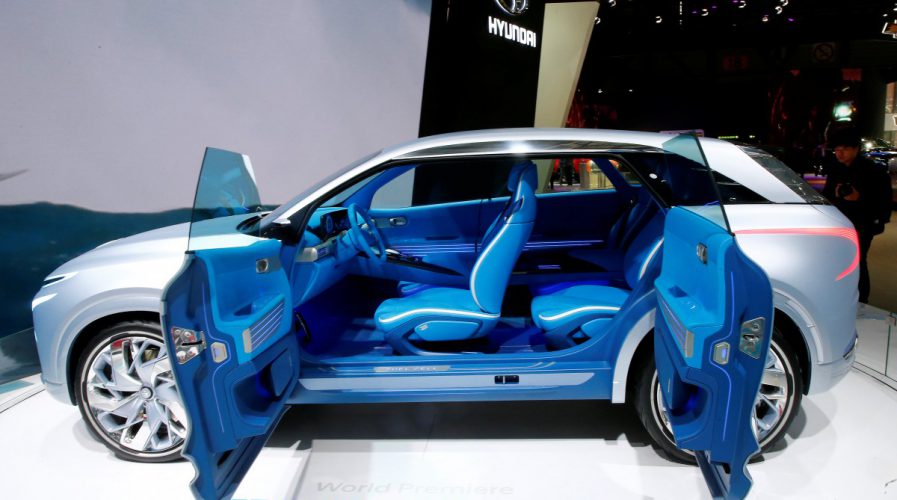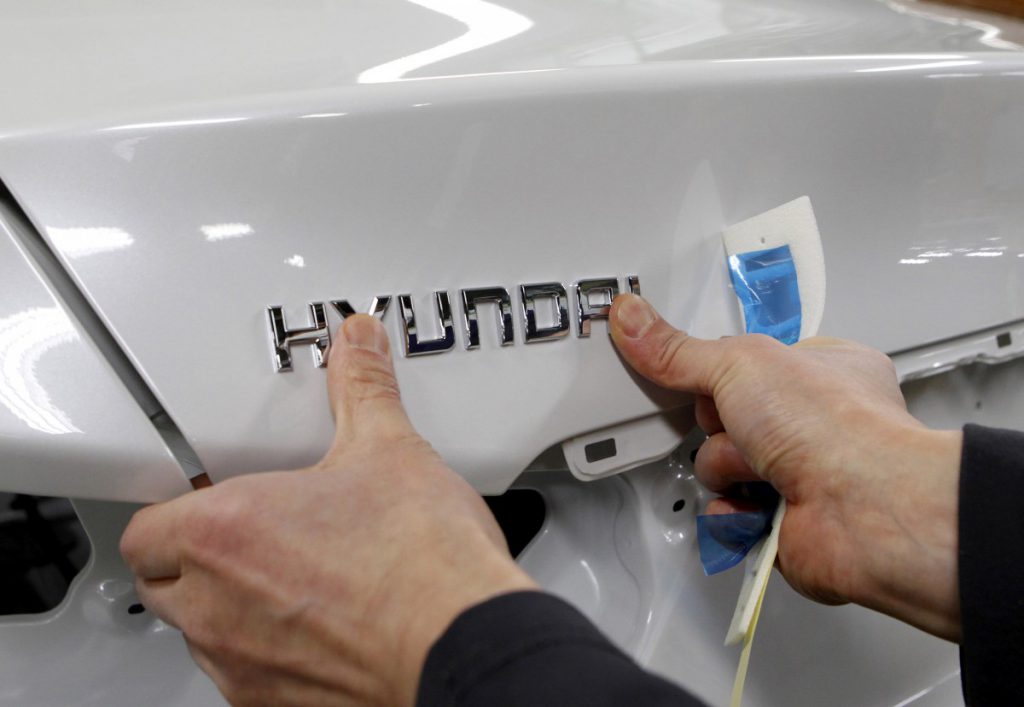
Other incumbent carmakers could adopt only EV and hybrid product policies soon, as demand for green-fueled vehicles rises. Source: Reuters
Automaker Hyundai begins developing plans for electric car infrastructure
THE electric car competition heats up even further with the entry of Hyundai Motor Co. into the game. The Korean automaker announced they are in the process of developing the first dedicated architecture to produce its own electric vehicles.
An executive at the company noted they intend to produce models that will be able to compete with market-dominant Tesla and other offerings in what is becoming an increasingly populated market.
The move is a marked detour from Hyundai’s previous stance as champion of fuel-cell vehicles. This also might signal the company is facing increased pressure from its investors to begin competing in what some might view as the next battlefield for automobiles.
Hyundai plans to unveil a new hydrogen-powered SUV next year with a longer driving range https://t.co/mOJ5vI95up pic.twitter.com/p9308A0hM8
— Bloomberg (@business) March 30, 2017
Analysts engaged by Reuters said Hyundai had little choice but to join the movement, made popular largely by Tesla, but compounded by entries by General Motors Co. and Mercedes-Benz’s Daimler AG unit.
“The separate platform may incur losses initially, but Hyundai will be left behind in the market if they don’t offer long-distance models, like 300km, 500km and 600km,” Ko Tae-bong, an analyst at Hi Investment & Securities, said.
How is Hyundai planning to differentiate itself?
The company is planning on rolling out small electric sports utility vehicles (SUVs), citing strong demand for the models. The spacious model would include a platform that allows the automaker to install the battery packs fueling the vehicles in the floor.
The subcompact or compact models would have a range of more than 300km (186 miles) per charge, and would be “more competitive” than rival offerings, lead of Hyundai-Kia’s green cars operations Lee Ki-sang said
“The electric-vehicle platform will require high up-front investments, but we are doing this to prepare for the future.” – Lee
It’s unclear if this extra cost will be absorbed by the company or passed onto the consumer, which might prove to be a risky strategy. Cost is, in large part, a major factor that influences sales of electric cars, which tend be pricier than their fuel-cell counterparts. Furthermore, Hyundai’s
Furthermore, Hyundai’s IONIQ hybrid-engine model fared poorly last year, unlike its sister company, Kia, which performed well with their hybrid unit, the Niro SUV.
The platform, however, will not be completed anytime soon, which is probably for the best as Lee was reportedly cautious about various uncontrollable factors that could hurt the company’s dwindling fortunes.
In the fourth quarter of 2016, the company reported a 39 percent fall in profit – its lowest in seven years – led mostly by weak car sales.

It is expected the cars would move to compete fiercely in China, where demand for electric-battery cars is exploding – the country estimates by 2020, five million electric vehicles will populate the streets.
China is already overtaking South Korea and Japan in the battery manufacturing industry – in early March, Beijing called on companies to start doubling production capacities for batteries, and Goldman Sachs estimates the country’s battery manufacturing industry will soon be valued at US$40 billion.
In fact, in China, Hyundai Motor was considering sourcing batteries from Contemporary Amperex Technology Ltd (CATL) because of subsidy restrictions on South Korean batteries, Lee said.
Hyundai’s efforts to benefit from the Chinese market might meet some problems as the local Chinese market is bolstered by large government subsidies, providing a boon to Chinese automakers.
Lee expects electric cars will own about 10 percent of total global vehicle sales by 2025 – currently the segment makes up for about one percent – and China will be the largest consumers.
As part of efforts to meet Chinese electric car quotas, Hyundai and Kia planned to introduce electric versions of its China-exclusive sedans and SUVs, while readying electrified models under local brands made with Chinese joint venture partners, Lee said
Are electric cars the future?
Of course, electric cars have been around for a long time, but they have struggled to make a huge change in the automotive industry, until recently that is. Hyundai’s push into the segment is symptomatic of a larger industry shift.
Hyundai’s push into the segment is symptomatic of a larger industry shift. The New York Times argues the rising demand for electric cars will pose the biggest threat to the global oil industry, as more people turn to green technology-based cars for their transport needs and crude oil prices continue on the uptick.
And the prices that currently posing a problem to growth are falling – new car prices in the US are clocking in around or below US$40,000.
SEE ALSO: China’s anti-Teslas – Cheap models drive electric car boom
Batteries still pose a problem for electric cars, as the current offerings cannot yet hold up to fuel-cell capabilities – electric car ranges plateau at around 160km per charge.
However, the latest innovations in the market should remedy that soon, even more so if demand keeps up and the economies of scale kick in. For example, GM is already toting their Bolt unit, a sporty hatchback with a proposed range of 383km.
The same goes for the lack of accessible charging infrastructure. Availability is becoming less of an issue, and demand for public charging point is growing in tandem with environmental awareness.
Industry executives have noted higher fuel prices due to the recent Organization of Petroleum Exporting Countries (Opec) negotiations and ever-tightening carbon emissions regulations in the West will drive further innovations in the electric cars segment as automakers fight to stay relevant.
(Additional reporting by Reuters)
READ MORE
- Ethical AI: The renewed importance of safeguarding data and customer privacy in Generative AI applications
- How Japan balances AI-driven opportunities with cybersecurity needs
- Deploying SASE: Benchmarking your approach
- Insurance everywhere all at once: the digital transformation of the APAC insurance industry
- Google parent Alphabet eyes HubSpot: A potential acquisition shaping the future of CRM
